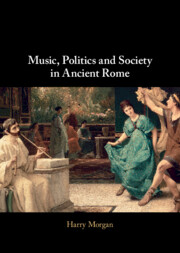Book contents
- Music, Politics and Society in Ancient Rome
- Music, Politics and Society in Ancient Rome
- Copyright page
- Contents
- Figures
- Acknowledgements
- Abbreviations
- Introduction
- 1 The Games of L. Anicius Gallus and the Cultural Politics of Music in the Second Century BCE
- 2 Popular Music and Popular Politics in the Late Republic
- 3 Augustus, Apollo’s Lyre and the Harmony of the Principate
- 4 Nero and the Age of Musomania
- Epilogue
- Bibliography
- Index
2 - Popular Music and Popular Politics in the Late Republic
Published online by Cambridge University Press: 24 November 2022
- Music, Politics and Society in Ancient Rome
- Music, Politics and Society in Ancient Rome
- Copyright page
- Contents
- Figures
- Acknowledgements
- Abbreviations
- Introduction
- 1 The Games of L. Anicius Gallus and the Cultural Politics of Music in the Second Century BCE
- 2 Popular Music and Popular Politics in the Late Republic
- 3 Augustus, Apollo’s Lyre and the Harmony of the Principate
- 4 Nero and the Age of Musomania
- Epilogue
- Bibliography
- Index
Summary
This chapter looks at the role of music in the political contests of the late Republic. Taking Cicero’s discussion of music in the De Legibus as a point of departure, the chapter argues that Cicero’s comments need to be seen against the background of major changes in the culture of Roman spectacle in the 50s BCE – most notably, the construction of Pompey’s stone theatre. Furthermore, the chapter identifies points of overlap in the critical discourse focused on musical entertainment and the hostile characterisations of the so-called populares (especially Gaius Gracchus and Publius Clodius). This collapsing of the boundaries between popular music and popular politics provides an important new angle on the political conflicts of the late Republic.
- Type
- Chapter
- Information
- Music, Politics and Society in Ancient Rome , pp. 83 - 141Publisher: Cambridge University PressPrint publication year: 2022

